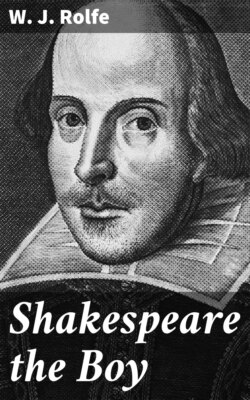Читать книгу Shakespeare the Boy - W. J. Rolfe - Страница 8
На сайте Литреса книга снята с продажи.
WARWICK IN HISTORY.
ОглавлениеTable of Contents
Only brief reference can be made here to the important part that Warwick, or its famous Earl, Richard Neville, the "King-maker," played in the English history on which Shakespeare founded several dramas—the three Parts of Henry VI. and Richard III. He is the most conspicuous personage of those troublous times. He had already distinguished himself by deeds of bravery in the Scottish wars, before his marriage with Anne, daughter and heiress of Richard Beauchamp, made him the most powerful nobleman in the kingdom. By this alliance he acquired the vast estates of the Warwick family, and became Earl of Warwick, with the right to hand down the title to his descendants. The immense revenues from his patrimony were augmented by the income he derived from his various high offices in the state; but his wealth was scattered with a royal liberality. It is said that he daily fed thirty thousand people at his numerous mansions.
The Lady Anne of Richard III., whom the hero of the play wooes in such novel fashion, was the youngest daughter of the King-maker, born at Warwick Castle in 1452. Richard says, in his soliloquy at the end of the first scene of the play:—
"I'll marry Warwick's youngest daughter.
What though I kill'd her husband and her father?"
Her husband was Edward, Prince of Wales, son of Henry VI., and was slain at the battle of Tewkesbury.
The Earl of Warwick who figures in 2 Henry IV. was the Richard Beauchamp already mentioned as the father of Anne who became the wife of the King-maker. He appears again in the play of Henry V., and also in the first scene of Henry VI., though he has nothing to say; and, as some believe, he (and not his son) is the Earl of Warwick in the rest of the play, in spite of certain historical difficulties which that theory involves. In 2 Henry IV. (iii. 1. 66) Shakespeare makes the mistake of calling him "Nevil" instead of Beauchamp.
The title of the Warwick earls became extinct with the death of the King-maker on the battle-field of Barnet. It was then bestowed on George, Duke of Clarence, who was drowned in the butt of wine by order of his loving brother Richard. It then passed to the young son of Clarence, who is another character in the play of Richard III. He, like his unfortunate father, was long imprisoned in the Tower, and ultimately murdered there after the farce of a trial on account of his alleged complicity in a plot against Henry VII. The subsequent vicissitudes of the earldom do not appear in the pages of Shakespeare, and we will not refer to them here.
